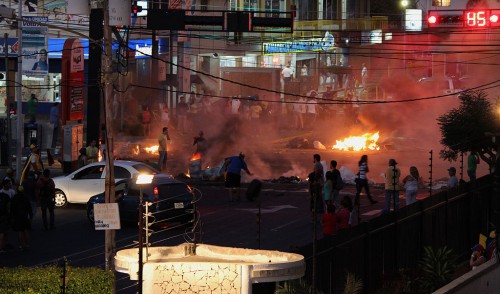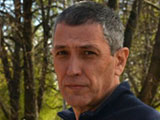The Legacy
by Israel Centeno / March 27, 2014 / No comments
How Hugo Chávez sowed the seeds of hate and violence in Venezuela.

Violence escalates in Maracaibo City during the February 2014 Venezuelan protests against the Nicolas Maduro government. Photo via Wikimedia Commons.
Venezuela, February 2014. At least twenty-six dead, almost all killed by accurate gunshots to the head. Executed, one might say, by paramilitary groups, intelligence officers, and the Bolivarian National Guard. More than a thousand detained. Reports of maltreatment, rape, and torture abound. Venezuela’s main cities, at the time of writing, a month after the protests began, appear devastated. Sukhoi fighter jets fly over the states of Táchira, Mérida, and Lara, spreading panic among civilians. Convoys of military tanks, surrounded by motorized patrols, traverse the streets and avenues of the turbulent country. President Nicolás Maduro is dancing salsa at the government headquarters and encouraging the paramilitary groups, who call themselves his “iron knights,” to terrorize neighborhoods and residential areas.

- From his lonely watch post Albert Camus asked who among us has not experienced exile yet
still managed to preserve a spark of fire in their soul. “We’re all alone,” Natalia Sedova cried in
exile on hearing of her husband Leon Trotsky’s affair with Frida Kahlo. In his novel Night
Watch, Stephen Koch follows the incestuous love affair of David and Harriet, wealthy
siblings watching the world from their solitary exile. Koch’s writing, Camus’s theories, and
Trotsky’s affair all come back to exile and lead me to reflect on the human condition. From my
own vantage point, my Night Watch, I will reflect on my questions of exile, writing, and the
human condition. 
- Israel Centeno was born in 1958 in Caracas, Venezuela, and currently lives in Pittsburgh as a Writer-in-Residence with City of Asylum/Pittsburgh. He writes both novels and short stories, and also works as an editor and professor of literature. He has published nine books in Venezuela and three in Spain.
The history of riot suppression in Venezuela, nevertheless, predates the events of February 12, 2014. To start with, I found myself tempted to react to the contingent term, but I had to establish a sense of perspective in order to gauge the common theme. Upon doing so, the all-knowing voice spoke up, the voice that once encouraged and still encourages—though now from beyond the grave—the discursive flood that poured forth for nearly fourteen years during the leadership of Lieutenant Colonel Hugo Chávez, the caudillo who nominated himself as the irreplaceable interpreter of the will of the Venezuelan people.
Several years later, his legacy is voiced with anger. In February 2014, his legacy is embodied by the motorized forces of the paramilitary, the revolutionary militias, the Bolivarian National Guard, and the rhetoric of his heirs. It’s a tangible legacy with a brutal death toll and an emphasis on the viciousness and animosity with which murders have been committed. Everything has been documented by the human rights organizations Provea and Cofavic and the Venezuelan Penal Forum.
If we had to give hate a form, it would be that of the government currently led by Nicolás Maduro, flanked by Diosdado Cabello and Rafael Ramírez. However, the government’s voice continues to be that of the late lieutenant-colonel, the indisputable leader, the deceased president.
Although it seems contradictory, instead of trying to contain the outpouring of protests, the powers-that-be have encouraged their armed wings to incite rioting and generate ill will.
Once Hugo Chávez became president in 1998, he attacked all spaces. After his power over the Constituent Assembly was established, he took control of the public authorities and permitted political aggression from both the military and those who, at that time, were known as revolutionary “colectivos.” Never before did a Venezuelan president have such backing and funding to transform the country’s reality. His speeches highlighted the failings of numerous sectors of society, but, above all, emphasized his resentment. A master manipulator of emotions, Chávez appealed to our base instincts from the very beginning. Instead of healing wounds through his interminable, omnipresent televised discourse, he drove the knife in deeper. Instead of reconciling, he divided. He took the Leninist motto as his own, deepening contradictions, not just to seize power, but to make it his forever. He turned to speeches on class hatred from the nineteenth century and broke apart all vulnerable flanks. Hugo Chávez built up not one, but several barricades, covered with every kind of booby-trap. In the case of Venezuela, the caudillo diagnosed the patient, not to cure him, but to exterminate him.
Chávez also called upon different foreign interests to join his board game. Guided by the advice of Argentinean fascist Norberto Ceresole, he combined the army, the caudillo, and the people into one single person.
His sermons were procedural litanies of hate.
From very early on, the Bolivarian revolution dehumanized anyone who thought differently or questioned the project. Vulgar, excitable, and inspired, Hugo Chávez simultaneously imitated the body language of Benito Mussolini, Juan Domingo Perón, and Fidel Castro. In this mise-en-scène, broadcast on all his platforms, he sowed hate and commenced an emotional civil war. This must be remembered when analyzing the death toll in Venezuela, which has been on the increase since 1998. In 2013 alone, there were 24,763 recorded victims of violence. For every ten cases, eight remain unsolved.
Nowadays, in February and March 2014, every time there’s a crisis, there’s verbal violence. Behind every gunshot, punch, and rape, behind the accuracy of headshots, behind the disfigurement of shooting victims, behind the home raids, behind the contempt for the protesters, one can find the legacy of hate and, with it, words taken from Chávez’s endless speeches. You only have to close your eyes to hear his voice: Scum, parasites, used condoms, white asses, lap-dogs of the empire, squealing pigs, stateless, emaciated…the diatribe goes on and on.
His legacy in short: Hate crimes, which, today, are carried out in his name to honor him after death.




